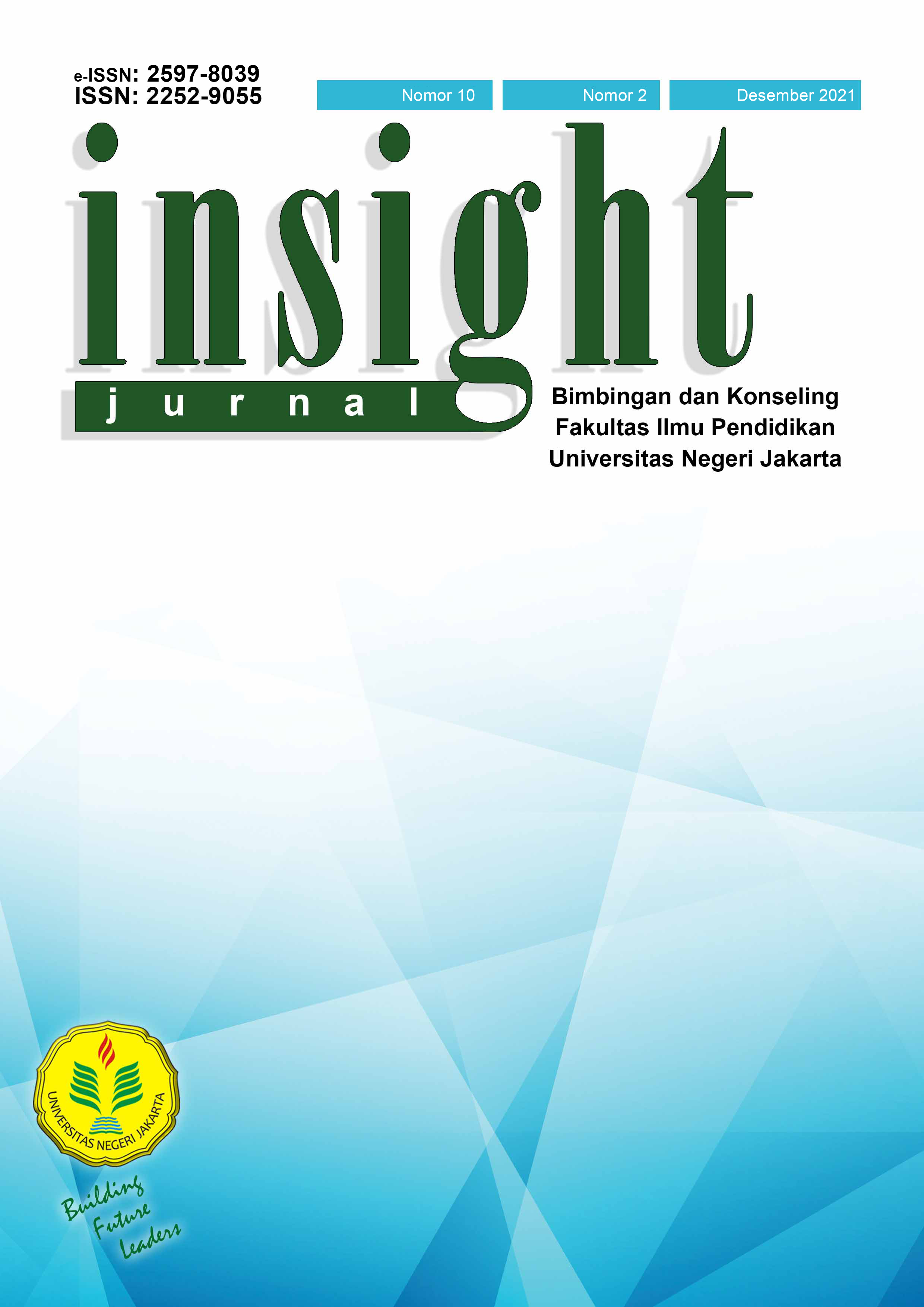Hubungan antara Self Compassion dengan Resiliensi pada Mahasiswa Tingkat Akhir
DOI:
https://doi.org/10.21009/INSIGHT.102.06Keywords:
Self Compassion, Resiliensi, Mahasiswa Tingkat AkhirAbstract
Penelitian ini bertujuan untuk mengetahui hubungan antara self compassion dengan resiliensi pada mahasiswa tingkat akhir. Penelitian ini menggunakan metode korelasi dengan pendekatan kuantitatif. Subjek dalam penelitian ini berjumlah 310 mahasiswa tingkat akhir Fakultas Ilmu Pendidikan Universitas Negeri Jakarta. Pengambilan sampel menggunakan Teknik accidental sampling. Alat pengumpul data berupa instrumen Skala Welas Diri (SWD) dan Connor-Davidson Resilience Scale (CD-RISC) Short version-10 item yang diadaptasi oleh peneliti. Hasil uji validitas menunjukkan semua butir pernyataan valid. Uji reliabilitas untuk variabel self compassion sebesar 0,962 dan untuk resiliensi 0,801 berada pada kategori sangat tinggi. Hasil penelitian menunjukkan bahwa terdapat hubungan positif antara self compassion dengan resiliensi pada mahasiswa tingkat akhir dengan koefisien korelasi 0,498 dan siginifikansi 0,000 (p<0,05).
References
Cahyani, Y. E., & Akmal, S. Z. (2017). Peranan spiritualitas terhadap resiliensi pada mahasiswa yang sedang mengerjakan skripsi. Psikoislamedia : Jurnal Psikologi, 2(1), 32–41. https://doi.org/10.22373/psikoislamedia.v2i1.1822
Campbell-Sill, L., & Stein, M. B. (2007). Psychometric analysis and refinement of the connor–davidson resilience scale (cd-risc): validation of a 10-item measure of resilience. Jurnal Traumatic Stress, 20(6), 1019–1028.
Caunia, R. (2020). Pengaruh self-compassion terhadap resiliensi mahasiswa rantau akibat pandemi covid-19. Universitas Negeri Jakarta.
Connor, K. M., & Davidson, J. R. T. (2003). Development of a new Resilience scale: The Connor-Davidson Resilience scale (CD-RISC). Depression and Anxiety, 18(2), 76–82. https://doi.org/10.1002/da.10113
Egeland, B., Carlson, E., & Sroufe, L. A. (1993). Resilience as process. Development and Psychopathology, 5(4), 517–528. https://doi.org/10.1017/S0954579400006131
Febrinabilah, R., & Listiyandini, R. A. (2016). Hubungan Antara Self- Compassion dengan Resiliensi pada Mantan Pecandu Narkoba Dewasa Awal. 1(1), 19–28.
Harning, A. D. (2018). Hubungan antara Self Compassion dengan Resiliensi pada Remaja dari Keluarga Bercerai.
Herrman, H., Stewart, D. E., Diaz-Granados, N., Berger, E. L., Jackson, B., & Yuen, T. (2011). What is resilience? Canadian Journal of Psychiatry, 56(5), 258–265. https://doi.org/10.1177/070674371105600504
Holaday, M., & McPhearson, R. W. (1997). Resilience and severe burns. Journal of Counseling and Development, 75(5), 346–356. https://doi.org/10.1002/j.1556-6676.1997.tb02350.x
Khoirunnisa, R. N., Jannah, M., Dewi, D. K., & Satiningsih. (2021). Prokrastinasi akademik mahasiswa tingkat akhir pada masa pandemi covid-19. Jurnal Psikologi Teori Dan Terapan, 11(3), 278–292. https://doi.org/http://dx.doi.org/10.26740/jptt.v11n3.p278-292
Neff, K. (2003a). Self-Compassion: An Alternative Conceptualization of a Healthy Attitude Toward Oneself. Self and Identity, 2, 85–101. https://doi.org/10.1080/15298860390129863
Neff, K. (2003b). The development and validation of a scale to measure Self-Compassion. Self and Identity, 2, 223–250. https://doi.org/10.1080/15298860390209035
Neff, K. (2011). Self-Compassion: Stop Beating Yourself Up and Leave Insecurity Behind. Harper Collins.
Neff, K. D., Hsieh, Y.-P., & Dejitterat, K. (2005). Self-compassion, achievement goals, and coping with academic failure. Self and Identity, 4(3), 263–287. https://doi.org/10.1080/13576500444000317
Neff, K. D., & McGehee, P. (2010). Self-compassion and psychological resilience among adolescents and young adults. Self and Identity, 9(3), 225–240. https://doi.org/10.1080/15298860902979307
Notario-Pacheco, B., Solera-Martínez, M., Serrano-Parra, M. D., Bartolomé-Gutiérrez, R., Martínez-Vizcaíno, V., & García-Campayo, J. (2011). Reliability and validity of the Spanish version of the 10-item Connor-Davidson Resilience Scale (10-item CD-RISC) in young adults. Health and Quality of Life Outcomes, 9(63), 1–6. https://doi.org/0.1186/1477-7525-9-63
Reivich, K., & Shatte, A. (2003). The Resilience Factor: 7 Keys to Finding Your Inner Strength and Overcoming Life’s Hurdles. Three Rivers Press.
Reyes, D. (2012). Self-Compassion: A Concept Analysis. Journal of Holistic Nursing, 30(2), 81–89. https://doi.org/10.1177/0898010111423421
Shlomi, H. (2010). The Relationship between Childhood Family Instability, Secure Attachment, and the Sense of Belonging of Young Adults. University of British Columbia, Okanagan.
Siebert, A. (2005). The Resilency Advantage. Berrett-Koehler Publishers.
Yusuf, A. M. (2014). Metode Penelitian Kuantitatif, Kualitatif & Penelitian Gabungan. Kencana. https://books.google.co.id/books?hl=id&lr=&id=RnA-DwAAQBAJ&oi=fnd&pg=PA2&dq=metode+kuantitatif&ots=Jx8sJqVEce&sig=dcqHyoitXhwGxDjWaTtLYgqWK6w&redir_esc=y#v=onepage&q=metode kuantitatif&f=false
Downloads
Published
Issue
Section
License
Authors who publish with this Journal agree to the following terms:
- Author retain copyright and grant the journal right of first publication with the work simultaneously licensed under a creative commons attribution licensethat allow others to share the work within an acknowledgement of the work’s authorship and initial publication of this journal.
- Authors are able to enter into separate, additional contractual arrangementfor the non-exclusive distribution of the journal’s published version of the work (e.g. acknowledgement of its initial publication in this journal).
- Authors are permitted and encouraged to post their work online(e.g. in institutional repositories or on their websites) prior to and during the submission process, as it can lead to productive exchanges, as well as earlier and greater citation of published works.
Users/public use of this website will be licensed to CC BY







